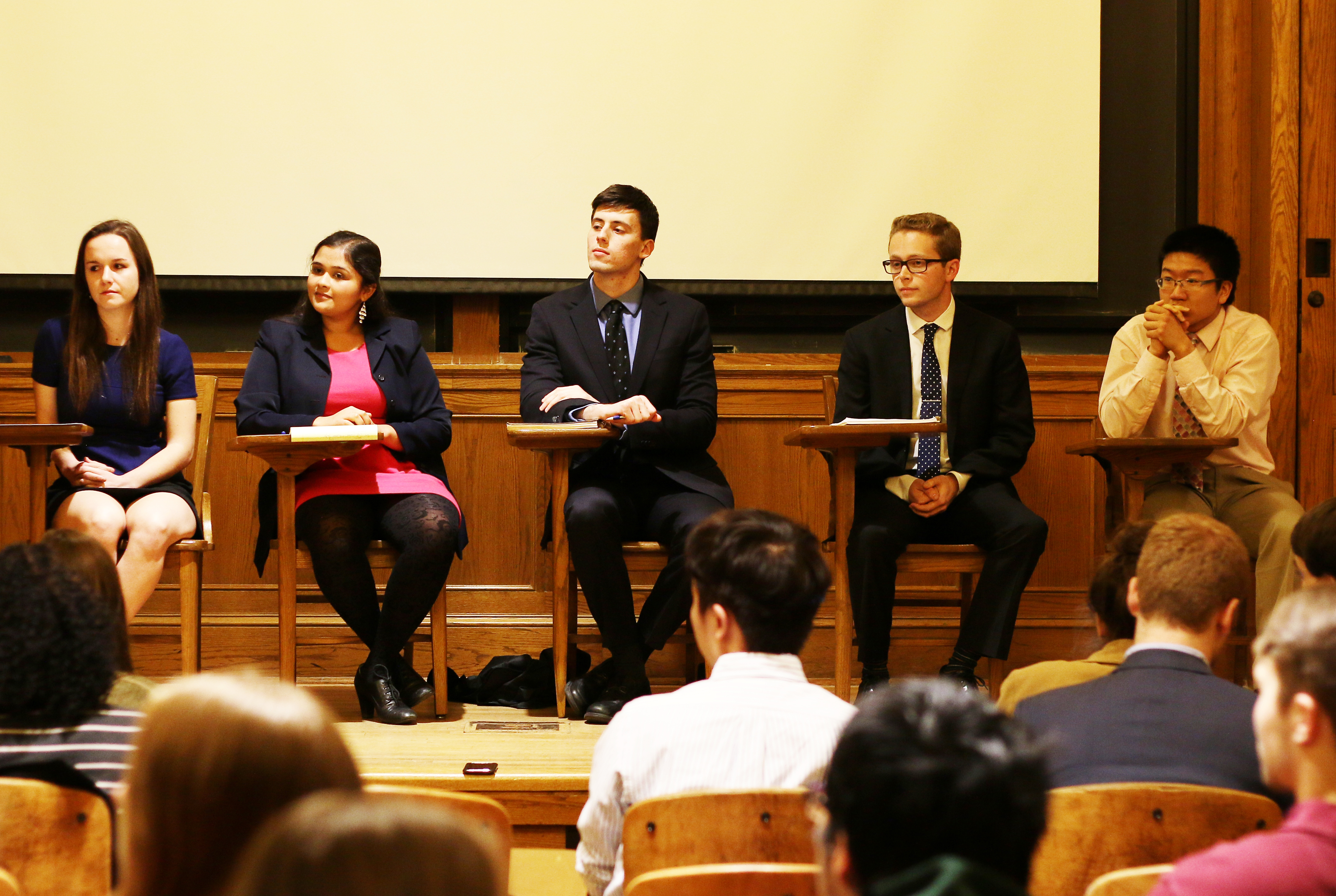
Before the Yale College Council election polls officially open on Thursday, candidates vying to lead the student government faced off on issues ranging from financial aid policy to athlete representation at a series of debates Tuesday in Linsly-Chittenden Hall before a crowd of close to 100 students.
Four vice-presidential candidates — Luis Patiño ’18, Christopher Bowman ’18, Kevin Sullivan ’18 and Zach Wilson ’18 — followed by five presidential candidates — Sarah Armstrong ’18, Peter Huang ’18, Carter Helschien ’18, Diksha Brahmbhatt ’18 and Josh Hochman ’18 — sparred in separate debates on how to better incorporate diverse student representation within YCC and administrative decisions. Candidates shared their visions on issues including how best to ensure direct and robust access to high-level decision makers within the University, as well as how to improve the campus sexual climate.
Vice-presidential candidates responded to questions regarding the improvement of resources available to the LGBTQ community and Yale’s mental health system. While the vice-presidential candidates disagreed on how best to incorporate diverse student voices within the YCC, all agreed there is a “credibility gap” between the YCC and students of color on campus.
The highlight of the night, the showdown among the five presidential candidates, immediately followed the vice-presidential debate. Some of the issues discussed included Yale’s mental health climate and the accountability of the University-Wide Committee on Sexual Misconduct.
“The YCC is not a policymaking body, it is an advocating body,” Armstrong said. “This election is really about who has been and who will continue to be the most effective in getting the administration to respond to the student body.”
Following last fall’s heated conversations surrounding campus diversity and inclusion, all of the presidential candidates said they agreed that the YCC’s role was to support student leaders and ensure that their voices are heard. Huang said the most efficient approach would be to have the YCC work with minority and activist student groups on campus and help the leaders of those organizations meet directly with University officials. Similarly, Brahmbhatt said rather than have the YCC act as an intermediary between students and administrators, undergraduate leaders should be able to meet and converse with these officials directly.
Similar to past years, this year’s presidential hopefuls also criticized the current relationship between the student body and the Yale Corporation. While the presidential candidates all agreed that the student body should be more involved with the University’s decision-making process, participants touted competing ideas on how best to reach this goal. Hochman said an undergraduate representative should be made a part of the Yale Corporation, adding that while such a change would not be possible to implement immediately, advocating for it now would be the only way to ensure it for the future. In contrast, Armstrong argued that adding a student representative to the Corporation would not be feasible, as it would require changing the body’s constitution as well as adding members from the University’s graduate and professional schools.
“One of YCC’s primary responsibilities is agenda-setting because we are a policy-advocacy organization, not an implementation organization,” Hochman said. “The president needs to decide what the YCC’s priorities are and one concern I’ve had is that the YCC hasn’t had the same priorities as the student body.”
Unlike last year, discussions of faculty diversity and campus inclusion were also at the forefront of this year’s debate. But some key topics from last year’s election — namely sexual misconduct and mental health — arose again. Brahmbhatt advocated for an online platform utilizing social media in order to provide better access to Yale’s sexual assault resources and facilitate the process of filing a formal complaint. On the topic of mental health and counseling, Helschien said that Yale’s mental health staff are not representative of the demographics of many of the students who seek their services. He added that the YCC should work with the cultural centers to ensure these problems are addressed.
Clay Dupuy ’18 said he thought some of the most important issues taken on during the debate were racial relations on campus, as well as financial aid and sexual assault.All of the presidential candidates, except for Helschien, have pledged to support a $15 minimum wage. Helschien said he does not support the $15 minimum wage because the money could be better distributed to scholarships, fellowships and grants to help low income students. He added that students should advocate for a pay wage that includes not just students, but employees as well.
Lauren Sapienza ’18 is running uncontested for events director and Zach Murn ’17 is also running unopposed for finance director. Both summarized their platforms after the presidential debate.
The debate was moderated by YCC Vice President Maddie Bauer ’17 and Yale Daily News Editor-in-Chief Stephanie Addenbrooke ’17.
Correction, April 13: A previous version of this article incorrectly stated that Helschien does not support eliminating the student income contribution. In fact, he does support eliminating the student income contribution and does not support raising the student minimum wage.







